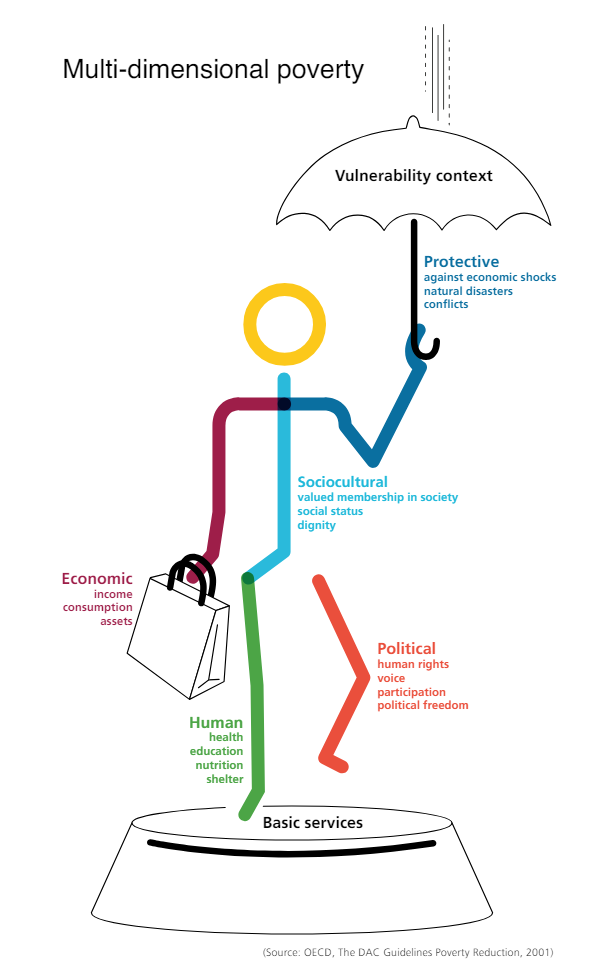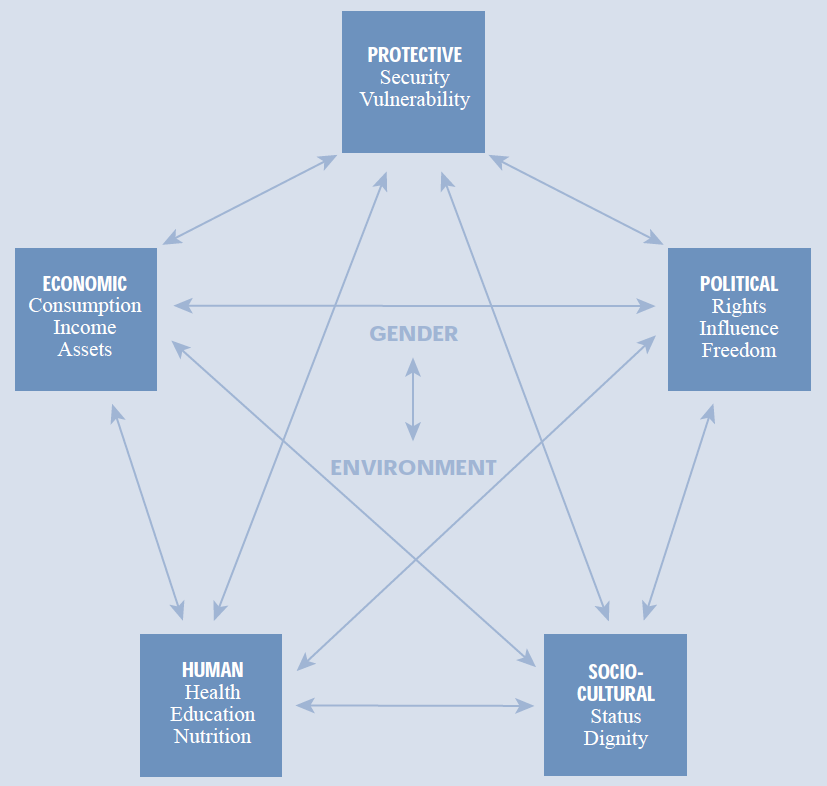Addressing Poverty in Practice
How can the SDC ensure that its activities are effective in reducing poverty? This section explores different ways of understanding in a holistic manner what it means to be poor – taking into account social inequities and discriminatory practices. In particular, we seek to highlight relevant global debates and issues through short articles written by development practitioners, who reflect on the implications of such global trends for field practice and for Swiss development policy.

Flip through the Sustainable Development Goals we aim to address when working on issues related to poverty:
Understanding Poverty

- Globally, one in nine people suffer from hunger and are not able to consume sufficient food to conduct an active and healthy life.
- 617 million youth worldwide lack basic mathematics and literacy skills.
- Globally, women’s participation in single or lower houses of national parliaments stood at 24.2 per cent in 2019.
- In 2019, about 648 million people lived in extreme poverty (less than 2.15 $/PPP/day).
The Poverty Brief (see below) explains SDC's understanding of poverty and introduces the main concepts around this theme. The paper summarises different ways of understanding and measuring poverty ranging from absolute, income-based definitions to multi-dimensional ones. It highlights that no single correct definition of poverty exists, but that we need to include particular social, cultural and historical contexts. Therefore, policy implications differ according to how poverty is defined. Finally, effective poverty reduction measures integrate the views of people living in poverty.
Multilateral Definitions of Poverty
Publications
Development Initiatives: The data side of leaving no one behind
“In order for people to count, you need to count people.” Births need to be registered, visits to health facilities need to be recorded, progress through school needs to be monitored. This is not the case in low income countries, particularly in fragile and conflict-affected states. To contribute to a better data collection, analysis and use, Development Initiatives developed their own approach called data landscaping. Its covers the political economy of data within a country; the structures and standards that govern the collection, the use of data, and much more. Every country has its own unique political economy, but that is not to say there are not many similarities. This report is the first attempt at mapping out this common ground at the national level and sharing revealing findings on what needs to be in place for people to be counted so they start counting.
World Development Report: Data for Better Lives
Data, which are growing at an unprecedented rate, are becoming an integral part of the daily lives of most people everywhere. But how does that matter for the more than 700 million people living in extreme poverty? According to this report by the World Bank, data can improve social and economic outcomes. But only if they are used systematically in ways that create information that generates insights that improve lives. The report aims to answer two fundamental questions. First, how can data better advance development objectives? Second, what kind of data governance arrangements are needed to use data in a safe, ethical, and secure way while also delivering value equitably?
Lessons Learned Report: Advancing Inclusive SDG Data Partnerships
Achieving the SDGs requires that progress and lags are being effectively monitored and reported. Monitoring and reporting can pinpoint where meeting the goals is on track, where progress is uneven, and where new approaches are needed. Existing official statistics are not enough to meet these monitoring and reporting needs. To fill the gap, alternative data sources, can complement official statistics to meet the SDG data challenge and ensure that no one is left behind. This joint learning report with Partners for Review (hosted by GIZ), the Danish Institute for Human Rights and the International Civil Society Centre summarises the initial experience and learnings generated by the SDG Data Partnerships initiative, which aims to support an enabling environment for inclusive collaborations.
Poverty and Shared Prosperity 2022: Correcting Course
The World Bank’s Poverty and Shared Prosperity series provides the latest estimates and trends in global poverty and shared prosperity. The 2022 edition provides the first comprehensive look at the landscape of poverty in the aftermath of an extraordinary series of shocks to the global economy. Global progress in reducing extreme poverty has virtually come to a halt. After COVID-19 dealt the biggest setback to global poverty in decades, rising food and energy prices—fueled by climate shocks and conflict among the world’s biggest food producers—have hindered a swift recovery. The report analyses how fiscal policy was used in the first year of the pandemic to support the most vulnerable groups. It also sheds light on the impact of taxes, transfers, and subsidies on poverty and inequality in 94 countries before 2020, providing important new insights into the impacts of fiscal policy not only during crises but also during normal conditions. The report identifies how governments can optimize fiscal policy to help correct course.
Economic poverty trends: Global, regional and national
This factsheet (updated in February 2023) provides an overview of poverty trends at global, regional and national levels. It unpacks the terminology used to describe poverty and explains how it is measured. Measuring poverty is vital because it supports action to improve the lives of people currently living in poverty and those at risk of experiencing poverty in the future. It provides the information required to support better decision-making, influence policy outcomes and increase accountability.
Indicators Matter to LNOB: A practical guide for project designers and implementers
Indicators matter in achieving the international commitments of the Agenda 2030 to “leave no one behind” (LNOB-Principle) in the fight against poverty (SDG 1), and in reducing inequality (SDG 10). As quantitative or qualitative variables, indicators provide a simple and reliable way to measure the achievements of development efforts. They can therefore show and track whether aid spending is reaching the poor and the left-behind groups in various contexts. What is measured is more likely to get addressed, because indicators provide a solid basis for evidence-based decision-making in development projects as well as in politics.
Measuring and Analysing Poverty
A wealth of data exists that can help us to understand poverty and there are multiple ways to analyse this data to reveal different aspects of poverty, inequality and how it impacts on people.
Pro-Poor Policies
Development thinking has moved a long way from the theory that broad economic development is good for all – few today would argue that the «trickle down» theory works in practice. Pro-active approaches addressing poverty may focus on one or more aspects of the phenomenon, depending on the context and the theory of change of the intervening agency. All these aspects may be addressed at different levels, from social protection measures at policy and legislative level to micro-interventions.
Examples of Pro-Poor Measures
- Addressing economic poverty: facilitating access to affordable credit (micro-credit, group banking, etc.); promoting income generation-generating opportunities (one specific approach being Making Markets work for the Poor, M4P); supporting dignified employment (including equal pay for equal work); and the increasingly popular measure of cash transfers.
- Building human capacities: promoting access to education for all – often entailing targeted scholarship for girls or other disadvantaged children; vocational skills training, and a wide variety of other long or short term training schemes, possibly targeted to particularly disadvantaged groups.
- Addressing political aspects of poverty: informing disadvantaged people of their rights and providing access to legal support; facilitating collective action; and building public speaking and negotiation capacities.
- Addressing socio-cultural aspects of poverty (this can require particularly carefully tailored interventions): facilitating the full and equal representation of different groups of people in community decision-making processes; working with both men and women to combat gender-based violence and mutilation; and supporting discriminated groups and individuals to claim their human rights.
- Building protective capacities: these measures concern the ability of people to withstand domestic and external shocks such as a severe illness or accident of a family member, or the loss of possessions following a flood or war. Insecurity and vulnerability are crucial aspects of poverty and may be particularly relevant in humanitarian crises in which identifying the most vulnerable can be a matter of life or death.
Further topics

Tools on Gender Equality and Social Inclusion
Practical tools and guidance to facilitate a pro-poor focus of SDC's strategies, programmes and projects.

Transversal themes of gender equality and social inclusion

Data and Leave No One Behind
On this page, you can access reports, studies, lessons learned and other publications from various organisations dedicated to the topic of data related to Leave No One Behind.

The Sustainable Development Goals Report 2023: Special edition
The report provides a powerful call to action, presenting a candid assessment of the SDGs based on the latest data and estimates.







